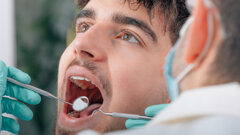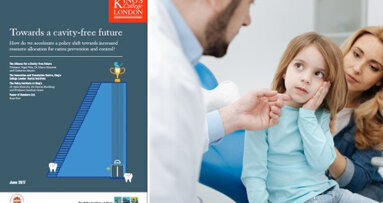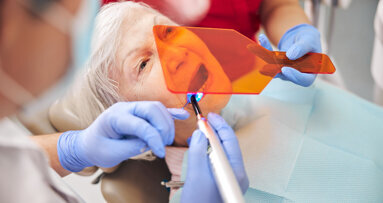NEWCASTLE, UK: Given the abundance of dietary recommendations that can be accessed these days, understanding what we should and should not eat can be a difficult task. It may come as a welcome surprise, then, that a recent review commissioned by the World Health Organization has shown that a diet rich in wholegrain carbohydrates is less likely to negatively impact oral health than a diet high in processed carbohydrates.
The findings come from a review of 33 papers on starch and oral health, conducted by researchers at Newcastle University. The analysed papers were studies of foods containing rapidly digestible starches, such as white bread, cake and pretzels, or slowly digestible starches, such as legumes and whole grains, and these foods’ relationships with dental caries, oral cancer and periodontal disease.
The researchers found that there was no evidence to suggest an association between the amount of starch eaten and dental caries. However, rapidly digestible starches were linked to an increased risk of dental cavities, since amylase, a component of saliva, is able to break these starches down into sugars.
Further findings from the review suggested that slowly digestible starches might offer protection against periodontal disease and lead to a lower risk of oral cancer. However, these findings are based on fewer available studies and weaker data.
“Despite an ill-advised fashion for eliminating carbohydrates from the diet, a carbohydrate-rich diet is shown to be fine for oral health so long as it is low in sugars and is based on wholegrain varieties of carbs such as pasta, couscous and wholemeal bread,” said lead researcher Dr Paula Moynihan, Professor of Nutrition and Oral Health at Newcastle University’s School of Dental Sciences.
“The key for shoppers is to look for wholemeal and wholegrain on the labels,” Moynihan added.
The WHO is in the process of updating its guidance regarding carbohydrate consumption. Currently, it recommends keeping free sugar intake—sugars added in the manufacturing process or present in fruit juice, honey and syrups—to less than 10 per cent of one’s daily caloric intake.
The paper, titled “Effects of starch on oral health: Systematic review to inform WHO guideline”, was published online in the Journal of Dental Research on 3 August 2018 ahead of inclusion in an issue.
PLYMOUTH, UK: As worldwide oral cancer rates continue to climb, our understanding of what causes the disease to occur, thankfully, also continues to grow. ...
NEWCASTLE UPON TYNE, England: The systematic and oral health effects of smoking are well established, including reduced calcium absorption, altered vitamin ...
LONDON, UK: A new report, published last week by the Alliance for a Cavity-Free Future (ACFF) and the Policy Institute at King’s College London in the UK,...
MELBOURNE, Australia/LONDON, UK: It is widely known that poor nutrition is a risk factor for frailty. Similarly, the link between nutrition and oral health ...
LONDON – New research has suggested that polycystin-2 (PKD 2), a protein encoded by the PKD 2 gene whose mutations have been associated with ...
HUDDERSFIELD, UK: A University of Huddersfield researcher is harnessing the latest virtual reality technology to help oral and maxillofacial surgical ...
MANCHESTER, UK: In the Greater Manchester region, the most common reason for young children being admitted to hospital is to have a tooth removed. In ...
The global dental composites market is anticipated to grow, due to changes in diet and lifestyle, and a rapidly growing geriatric population across the ...
MANCHESTER, UK: Dental guidelines in the UK, as in many countries, are predicated upon the knowledge that dental infections respond better to treatment ...
CHICAGO, US/LONDON, UK: A new study presented during the 2018 American Heart Association Scientific Sessions held recently has suggested that brushing ...
Dr. Vasiliki Maseli DDS, MS, EdM
Live webinar
Wed. 4 March 2026
5:00 pm UTC (London)
Munther Sulieman LDS RCS (Eng) BDS (Lond) MSc PhD
Live webinar
Wed. 4 March 2026
6:00 pm UTC (London)
Live webinar
Thu. 5 March 2026
1:30 am UTC (London)
Lancette VanGuilder BS, RDH, PHEDH, CEAS, FADHA
Live webinar
Fri. 6 March 2026
8:00 am UTC (London)
Live webinar
Tue. 10 March 2026
8:00 am UTC (London)
Assoc. Prof. Aaron Davis, Prof. Sarah Baker
Live webinar
Wed. 11 March 2026
12:00 am UTC (London)
Dr. Vasiliki Maseli DDS, MS, EdM



 Austria / Österreich
Austria / Österreich
 Bosnia and Herzegovina / Босна и Херцеговина
Bosnia and Herzegovina / Босна и Херцеговина
 Bulgaria / България
Bulgaria / България
 Croatia / Hrvatska
Croatia / Hrvatska
 Czech Republic & Slovakia / Česká republika & Slovensko
Czech Republic & Slovakia / Česká republika & Slovensko
 France / France
France / France
 Germany / Deutschland
Germany / Deutschland
 Greece / ΕΛΛΑΔΑ
Greece / ΕΛΛΑΔΑ
 Hungary / Hungary
Hungary / Hungary
 Italy / Italia
Italy / Italia
 Netherlands / Nederland
Netherlands / Nederland
 Nordic / Nordic
Nordic / Nordic
 Poland / Polska
Poland / Polska
 Portugal / Portugal
Portugal / Portugal
 Romania & Moldova / România & Moldova
Romania & Moldova / România & Moldova
 Slovenia / Slovenija
Slovenia / Slovenija
 Serbia & Montenegro / Србија и Црна Гора
Serbia & Montenegro / Србија и Црна Гора
 Spain / España
Spain / España
 Switzerland / Schweiz
Switzerland / Schweiz
 Turkey / Türkiye
Turkey / Türkiye
 UK & Ireland / UK & Ireland
UK & Ireland / UK & Ireland
 International / International
International / International
 Brazil / Brasil
Brazil / Brasil
 Canada / Canada
Canada / Canada
 Latin America / Latinoamérica
Latin America / Latinoamérica
 USA / USA
USA / USA
 China / 中国
China / 中国
 India / भारत गणराज्य
India / भारत गणराज्य
 Pakistan / Pākistān
Pakistan / Pākistān
 Vietnam / Việt Nam
Vietnam / Việt Nam
 ASEAN / ASEAN
ASEAN / ASEAN
 Israel / מְדִינַת יִשְׂרָאֵל
Israel / מְדִינַת יִשְׂרָאֵל
 Algeria, Morocco & Tunisia / الجزائر والمغرب وتونس
Algeria, Morocco & Tunisia / الجزائر والمغرب وتونس
 Middle East / Middle East
Middle East / Middle East
















































